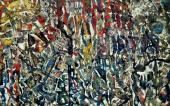Worlds Apart? Futures of Global History - International Conference
Die zweitätige Konferenz versucht, die Ungleichgewichte und Ungleichheiten im Bereich der Globalgeschichte zu benennen, indem sie die jüngste Kritik an der Disziplin als Ausgangspunkt nimmt und in produktive Fragen umwandelt: Wie kann eine breitere Akzeptanz von Globalgeschichte erreicht werden? Wie kann das thematische und narrative Repertoire der Globalgeschichte erweitert werden? Wie können wir die politischen und ökonomischen Ungleichheiten überwinden, die das Feld der Globalgeschichte bestimmen? Welche alternativen Methoden und Ansätze könnten das Fach bereichern? Welche Themen und Konzepte sollten in Zukunft in den Vordergrund gerückt werden?
Veranstalter: Hubertus Büschel, Norman Aselmeyer und Weltmuseum Wien
Die Veranstaltung findet auf Englisch statt.
Dauer: 2 Tage (Do, 25 Mai, 9.30 -19.30 Uhr & Fr, 26 Mai, 9.30 bis 20 Uhr)
Teilnahme vor Ort: frei (für den Besuch der Ausstellungen ist ein gültiges Museumsticket erforderlich)
Anmeldung erforderlich!
Treffpunkt: Weltmuseum Wien Forum
Teilnahme über Zoom: hier
Programm Tag 1
Dienstag, 25. Mai, 9.30 bis 19.30 Uhr
9.30 Uhr
Registrierung
10–10.15 Uhr
Begrüßung & Willkommensworte
Anna Hofmann (ZEIT-Stiftung Ebelin und Gerd Bucerius), Norman Aselmeyer (Universität Bremen), Hubertus Büschel (Universität Kassel), Jonathan Fine (Weltmuseum Wien)
10.15–11 Uhr
ERÖFFNUNGSVORTRAG
Jeremy Adelman (Princeton University)
Global History Now – Again
11–11.30 Uhr
Tee- und Kaffeepause
11.30–13 Uhr
ROUNDTABLE
Global History at the Crossroads: Where Do we Stand?
Moderation: Lucy Riall (European University Institute, Florence)
Richard Drayton (King’s College London)
Nancy R. Hunt (University of Florida)
Hermann Mückler (Universität Wien)
Rila Mukherjee (University of Hyderabad)
Carmen Nava (California State University San Marcos)
Akita Shigeru (Osaka University)
13–14 Uhr
Mittagspause
14–16 Uhr
PANEL 1: Politics of Global History
Chair: Eric Burton (Universität Innsbruck)
Adrián Lerner Patrón (University of Cambridge/Freie Universität Berlin)
The Politics of Global History: The Question of Primacy
Kaveh Yazdani (University of Connecticut)
Periodizing Global History, Deprovincializing the West and Universalizing the “Rest”
Ye Liu (New School for Social Research)
To Historicize Decolonization: Bringing the “Other” Back in
Alessandro Stanziani (EHESS)
The Problem with (Euro)centrism
16–18 Uhr
Tee- und Kaffeepause
16.30 Uhr
Führung durch das Weltmuseum Wien für Redner*innen
18 –19.30 Uhr
KEYNOTE LECTURE
Sujit Sivasundaram (University of Cambridge)
The Global and the Earthy
Programm Tag 2
Freitag, 26. Mai 2023, 9.30 bis 20 Uhr
9.30–11.30 Uhr
PANEL 2: Methods and Sources of Global History
Chair: Julia Hauser (Universität Kassel)
Pol Dalmau & Jorge Luengo (Pompeu Fabra University, Barcelona)
National Histories Go Global: A Futile Endeavour?
Chao Tayiana Maina (African Digital Heritage, Nairobi)
Plurality and Purpose: Digital Methodologies for Community Based Histories
Agata Błoch (Polish Academy of Sciences) & Demival Vasques Filho (IEG Mainz)
Big Data, Natural Language Processing Methods and Sources in Global History
Fabio Santos (Freie Universität Berlin)
Global History Against the Archival Grain: Critical Fabulation as Decolonial Method
11.30–11.45 Uhr
Tee- & Kaffeepause
11.45–13.15 Uhr
PANEL 3: Systems of Knowledge
Chair: Valeska Huber (Universität Wien)
Delia González de Reufels (Universität Bremen)
Reinventing Global History? Historians of Latin America and a Controversial Field of Historic Research
Joshua Meeks (U.S. Naval War College, Newport)
Blood and Stone: Ontology, History, and the State
Sabelo J. Ndlovu-Gatsheni (Universität Bayreuth)
(Re)provincializing Europe and (De)provincializing Africa: A Contribution Towards Decolonizing Global History
13.15–14.15 Uhr
Mittagspause
14.15–16.15 Uhr
PANEL 4: Narratives and Languages of Global History
Chair: Karolin Wetjen (Universität Göttingen)
Anwesha Ghosh (National Law School of India University, Bangalore)
Living in Italics: Southern Vocabulary and the Politics of Untranslatability
Nora Lafi (ZMO, Berlin)
Challenging the Global Narratives of Global History: An Exploration of Alternative Paths from the Arab World
Sisay Megersa Dirirsa (Universität Bielefeld)
The Ambivalence of Global History and the Deficit of the “Post-Colonial:” Is a Pluriversal History Possible?
Ann McGrath (The Australian National University, Canberra)
Temporalities and Historicities: What “Primitive Earth” Carried Across Hemispheres
16.15–16.30 Uhr
Tee- Kaffeepause
16.30–18.30 Uhr
PANEL 5: Topics and Concepts of Global History
Chair: Sasson Sofer (The Hebrew University, Jerusalem)
Chelsea Schields (University of California, Irvine)
Gender, Sexuality, and Race: Intersecting Concepts in Global History
Cassandra Thiesen-Mark (Universität Bayreuth)
From Illusions of Universality Towards an Innovative, “Incomplete” Global History
Luise White (University of Florida)
Can we Change the Subject? Africa and Global History
Joël Glasman (Universität Bayreuth)
Beyond Global Citizenship: Four Forms of Impacts of Global History
18.30–20 Uhr
ROUNDTABLE & ABSCHLUSSDISKUSION
Whither Global History: Does the Field Have a Future?
Moderation: David Motadel (LSE)
Christian de Vito (Universität Bonn)
Toyin Falola (University of Austin)
Valeska Huber (Universität Wien)
Martina Kaller (Universität Wien)
Dilip Menon (University of the Witwatersrand, Johannesburg)










 AnachB Routenplaner
AnachB Routenplaner 











